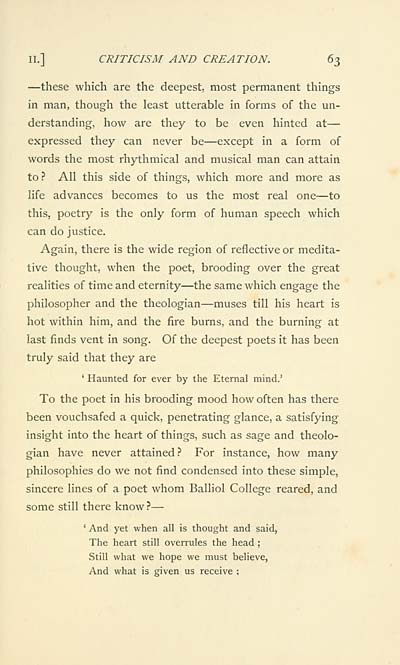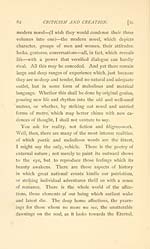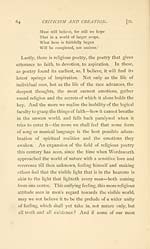Download files
Complete book:
Individual page:
Thumbnail gallery: Grid view | List view

II.] CRITICISM AND CREATION. 6^
— these which are the deepest, most permanent things
in man, though the least utterable in forms of the un-
derstanding, how are they to be even hinted at —
expressed they can never be — except in a form of
words the most rhythmical and musical man can attain
to? All this side of things, which more and more as
life advances becomes to us the most real one — to
this, poetry is the only form of human speech which
can do justice.
Again, there is the wide region of reflective or medita-
tive thought, when the poet, brooding over the great
realities of time and eternity — the same which engage the
philosopher and the theologian — muses till his heart is
hot within him, and the fire burns, and the burning at
last finds vent in song. Of the deepest poets it has been
truly said that they are
' Haunted for ever by the Eternal mind.'
To the poet in his brooding mood how often has there
been vouchsafed a quick, penetrating glance, a satisfying
insight into the heart of things, such as sage and theolo-
gian have never attained? For instance, how many
philosophies do we not find condensed into these simple,
sincere lines of a poet whom Balliol College reared, and
some still there know ? —
' And yet when all is thought and said,
The heart still overrules the head ;
Still what we hope we must believe,
And what is given us receive ;
— these which are the deepest, most permanent things
in man, though the least utterable in forms of the un-
derstanding, how are they to be even hinted at —
expressed they can never be — except in a form of
words the most rhythmical and musical man can attain
to? All this side of things, which more and more as
life advances becomes to us the most real one — to
this, poetry is the only form of human speech which
can do justice.
Again, there is the wide region of reflective or medita-
tive thought, when the poet, brooding over the great
realities of time and eternity — the same which engage the
philosopher and the theologian — muses till his heart is
hot within him, and the fire burns, and the burning at
last finds vent in song. Of the deepest poets it has been
truly said that they are
' Haunted for ever by the Eternal mind.'
To the poet in his brooding mood how often has there
been vouchsafed a quick, penetrating glance, a satisfying
insight into the heart of things, such as sage and theolo-
gian have never attained? For instance, how many
philosophies do we not find condensed into these simple,
sincere lines of a poet whom Balliol College reared, and
some still there know ? —
' And yet when all is thought and said,
The heart still overrules the head ;
Still what we hope we must believe,
And what is given us receive ;
Set display mode to: Large image | Transcription
Images and transcriptions on this page, including medium image downloads, may be used under the Creative Commons Attribution 4.0 International Licence unless otherwise stated. ![]()
| Early Gaelic Book Collections > Ossian Collection > Aspects of poetry > (79) |
|---|
| Permanent URL | https://digital.nls.uk/78386220 |
|---|
| Description | Selected books from the Ossian Collection of 327 volumes, originally assembled by J. Norman Methven of Perth. Different editions and translations of James MacPherson's epic poem 'Ossian', some with a map of the 'Kingdom of Connor'. Also secondary material relating to Ossianic poetry and the Ossian controversy. |
|---|
| Description | Selected items from five 'Special and Named Printed Collections'. Includes books in Gaelic and other Celtic languages, works about the Gaels, their languages, literature, culture and history. |
|---|

